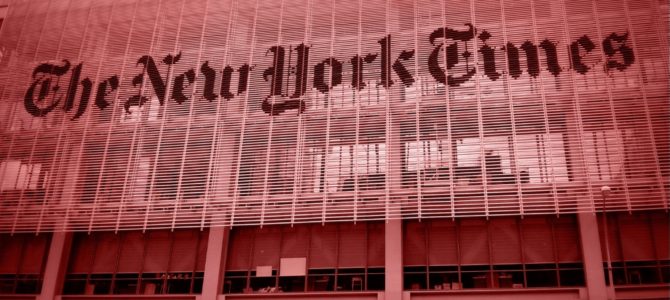
After the Capitol riots of Jan. 6 and the aftermath, you’d be forgiven if you missed the latest egregious example of The New York Times shilling for Communist China. Yet, on Jan. 4, that’s exactly what we got — the Times ran as straight news Chinese Communist Party (CCP) agitprop fit for the pages of The People’s Daily.
Imagine, that during the height of Stalinism, as millions died from a Communism-induced famine, an American publication ran headlines like “Russians Hungry, But Not Starving?”
Imagine, that during the height of Nazism, as Adolf Hitler worked to exterminate the Jewish people, an American publication consciously downplayed and buried coverage of the Holocaust?
The New York Times did precisely these things. Now, it appears it wants to complete the trifecta of effectively shilling for the world’s most monstrous regimes by glorifying that of Communist China as it seeks to supplant the United States as the world’s preeminent power.
“The [coronavirus] pandemic has upended many perceptions, including ideas about freedom,” wrote columnist Li Yuan in the Jan. 4 article. While Chinese citizens “don’t have freedom of speech, freedom of worship or freedom from fear — three of the four freedoms articulated by President Franklin D. Roosevelt,” she continued, unironically, “they have the freedom to move around and lead a normal day-to-day life.”
The idea that the Chinese people have the “freedom to…lead a normal day-to-day life” might be news to the Uighurs laboring in Xinjiang’s modern-day gulags, the Falun Gong practitioners facing forced organ harvesting, and the Christians seeing the Bible “Sinicized” while their churches are demolished and their pastors are detained. It might be news even to prominent CCP members like Jack Ma.
It seems the idea that the “freedom to…lead a normal day-to-day life” requires freedom of speech and worship, and from a totalitarian government, was lost on the Yuan.
The columnist’s Communist Party-legitimizing assertion comes in the context of an article almost singularly devoted to cheerleading. It portrays a China that is open, thriving, and vibrant while the free world is largely closed — suffering from the coronavirus that the CCP covered up and helped spread.
Yuan does so without any honest scrutiny of China’s success in seeking to convert a calamity for which it is most responsible into a propaganda coup, and without questioning of the wisdom of America’s economy-crippling, socially-undermining, liberty-imperiling response. Such an article might have provided worthy insights to readers. Instead, it takes Communist China’s narrative at face value and then cherry-picks interview subjects to validate it.
To claim China “has become one of the safest places in the world,” the author cites an unbelievable claimed figure of fewer than 100,000 coronavirus infections during 2020. As a consequence of such “safety,” in the words of the columnist, “[China] resembles what ‘normal’ was like in the pre-pandemic world. Restaurants are packed. Hotels are full. Long lines form outside luxury brand stores. Instead of Zoom calls, people are meeting face to face to talk business or celebrate the new year.”
To build this argument about China’s smashing success, the author appeals to several individuals meant to serve as representatives of the free world — from America, and Hong Kong — effusive with praise for the mainland. Left unsaid is that, given the business interests the interview subjects have in China, they have to laud it.
Unspoken is the reality that if such individuals wish to prosper, they must kiss the ring of the CCP that controls every aspect of the lives of those operating within, and increasingly without its borders. Thus, we are treated to comments such as these:
- A prominent Western businessman who has worked with and advised Chinese companies and entrepreneurs for several decades, states that, “The ability to…live a normal life is pretty amazing.” Having recently attended a Scottish ball in Beijing—which, like Shanghai, the columnist tells us, is becoming “increasingly cosmopolitan”—the businessman suggested that China “feels a bit like the Epcot Center at Disney…the microcosm of the West is still here, but the West is shut down at the moment.”
- A “retired lawyer in California who invests in start-ups on both sides of the Pacific,” is described as “enjoying his time in China” since flying to Shanghai from San Francisco in the fall, having “hosted business dinners attended by as many as 20 people, gone to a jazz bar, seen a movie, visited a seafood market and flown to Shenzhen, in southern China, to check out a self-driving car start-up.” He noted that the Chinese people he met on his travels were “perplexed,” and “incredulous” about American infection rates.
- An investor who moved from Hong Kong to Beijing over the summer tells readers that “the Communist Party has provided the public a social good: stability.” The investor, who is described as “bullish on the Chinese economy,” suggested that he had left for the mainland because he does not “think I can find the kind of freedom I want in Hong Kong.”
One could be forgiven for thinking this was a tourist pamphlet, rather than a column in America’s most prominent newspaper.
The columnist presents not one dissenting view to contrast these Pollyannaish accounts of Chinese life. The best she can do to create an appearance of balance is acknowledge that China “silenced those who tried to warn the world in the early days of the outbreak,” and that “freedom of movement comes at the expense of nearly every other kind.”
Nevertheless, she concludes that the purported positive results of China’s coronavirus response “could plant doubts about other types of freedom.” When the columnist suggests that “the West may find it has to work harder to sell its vision of freedom after China has made its model seem so attractive,” one wonders if she realizes that she is contributing to the view that that model is legitimate.
By providing the imprimatur of a leading U.S. publication to this most friendly of CCP-friendly narratives, providing it a propaganda coup, the New York Times is, in effect, serving as an unregistered foreign agent for Communist China. On one level it’s sickening that the Times, like so many other publications, is effectively carrying out Chinese information operations. On another, we should appreciate the inadvertent candor.
The American people should know that there is a crystal-clear choice between the American people and a Ruling Class — for which the New York Times serves as a proxy — that is completely in hoc to the CCP and thus seeks to curry favor with, profit from, and even emulate it to accrue still greater power and privilege. This is the defining issue of our time for our national security and foreign policy.









